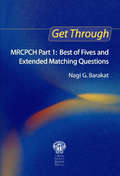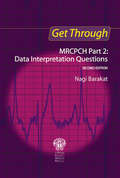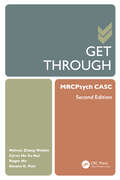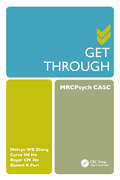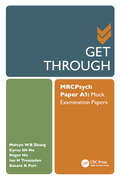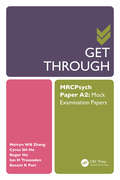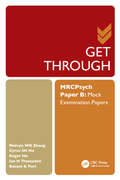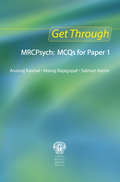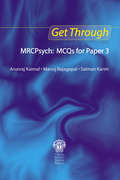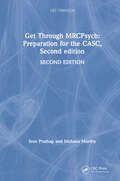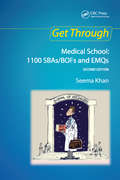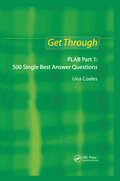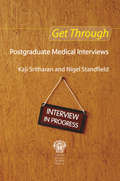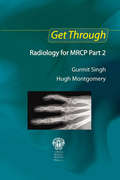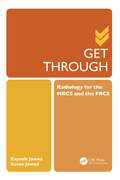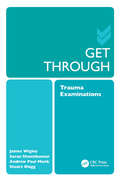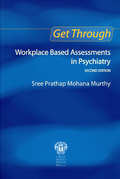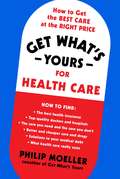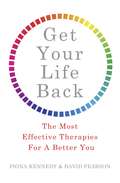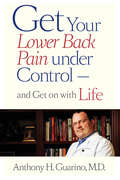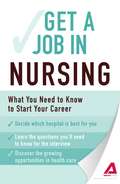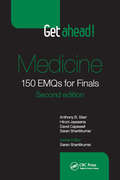- Table View
- List View
Get Through MRCPCH Part 1: Best of Fives and Extended Matching Questions (Get Through)
by Nagi BarakatGet Through MRCPCH Part 1: BOFs and EMQs is an essential revision tool for candidates preparing for the MRCPCH Part 1 examination. This easy to read and comprehensive text has been written in response to changes in the MRCPCH entry criteria and contains 500 questions using the Best of Fives (BOFs) or Extended Matching Questions (EMQs) format. Recommended to all candidates sitting the MRCPCH Part 1 exam, their trainers, and paediatricians wishing to update their knowledge.
Get Through MRCPCH Part 2: Data Interpretation Questions, second edition (Get Through)
by Nagi BarakatGet Through MRCPCH Part 2: Data Interpretation Questions is based on the original title, 100 Data Interpretation Questions in Paediatrics for MRCPCH/MRCP, and provides valuable revision material for candidates sitting the two written papers for Part 2 of the Membership of the Royal College of Paediatrics and Child Health (MRCPCH) exam. This new edi
Get Through MRCPsych CASC (Get Through)
by Roger Ho Basant K. Puri Melvyn Zhang Weibin Cyrus Ho Su HuiGet Through MRCPsych CASC, Second Edition is intended for psychiatric trainees sitting the CASC component of the MRCPsych exam. Written by authors with recent exam experience and long-term expertise in the field, the text provides over 100 stations closely matched to the subjects that appear in the actual exam, along with informative diagrams, concise synopses, and guidelines for how to target your revision to enable recall of the most relevant information. *Gives a detailed appraisal of how to approach over 100 stations for the CASC component of the examination *Shares the guidance of experts in Psychiatry and Medical Education *Builds on a successful first edition with tips on pitfalls
Get Through MRCPsych CASC: Mock Examination Papers (Get Through)
by Melvyn W. Zhang Cyrus S. Ho Roger C. Ho Basant K. PuriThis book is intended for psychiatric trainees sitting the CASC component of the MRCPsych exam. Written by authors with recent exam experience and long-term expertise in the field, the text provides 175 stations closely matched to the subjects that appear in the actual exam, along with concise synopses and guidelines for how to target your revision to enable recall of the most relevant information.
Get Through MRCPsych Paper A1: Mock Examination Papers (Get Through)
by Roger Ho Ian H Treasaden Basant K Puri Melvyn Wb Zhang Cyrus Sh HoThe MRCPsych examinations, conducted by the Royal College of Psychiatrists are the most important exams for psychiatric trainee to achieve specialist accreditation. <P><P>Written by authors with previous exam experience and edited by the distinguished team behind Revision Notes in Psychiatry, Get Through MRCPsych Paper A: Mock Examination Papers provides candidates with the most realistic and up-to-date MCQ and EMIs, closely matched to themes appearing most often in the Paper A exam.
Get Through MRCPsych Paper A2: Mock Examination Papers
by Roger Ho Ian H Treasaden Basant K Puri Melvyn Wb Zhang Cyrus Sh HoThe MRCPsych examinations, conducted by the Royal College of Psychiatrists are the most important exams for psychiatric trainee to achieve specialist accreditation. Written by authors with previous exam experience and edited by the distinguished team behind Revision Notes in Psychiatry, Get Through MRCPsych Paper A: Mock Examination Papers provides candidates with the most realistic and up-to-date MCQ and EMIs, closely matched to themes appearing most often in the Paper A exam.
Get Through MRCPsych Paper B: Mock Examination Papers (Get Through Ser.)
by Melvyn WB Zhang Cyrus SH Ho Ian H Treasaden Basant K Puri Roger CM HoThe MRCPsych examinations, conducted by the Royal College of Psychiatrists, are the most important exams for psychiatric trainees to achieve specialist accreditation. Written by authors with recent exam success and edited by the distinguished team behind Revision Notes in Psychiatry, Get Through MRCPsych Paper B: Mock Examination Papers provides candidates with the most realistic and up-to-date MCQ and EMIs, closely matched to themes appearing most often in the Paper B exam.
Get Through MRCPsych: MCQs for Paper 1 (Get Through)
by Arunraj Kaimal Manoj Rajagopal Salman KarimProviding candidates with an invaluable and comprehensive bank of revision questions to help them achieve success in this exam, Get Through MRCPsych: MCQs for Paper 1 is an essential revision guide for all psychiatry trainees preparing for the Paper 1 exam. Complements the Paper 2 and Paper 3 titles in the series.
Get Through MRCPsych: MCQs for Paper 3 (Get Through)
by Arunraj Kaimal Manoj Rajagopal Salman KarimCompletely up to date with the latest examination changes, Get Through MRCPsych: MCQs for Paper 3 contains over 380 'best answer 1 of 5' multiple choice questions (MCQs) presented in a format closely matching the new syllabus. Modelled on actual exam questions so that they accurately reflect the style and level of difficulty, candidates can te
Get Through MRCPsych: Preparation for the CASC, Second edition (Get Through Ser.)
by Sree Prathap Mohana MurthyGet Through MRCPsych: preparation for the CASC is a second edition of Get Through MRCPsych Part 1: Preparation for the OSCES - 978-1-85315-590-X. This book will not only prepare you for the examination, but will also help you face clinical situations confidently and effectively. The author, Sree Prathap Mohana Murthy, has passed the MRCPsych examin
Get Through MRCS Part A: SBAs (Get Through Ser.)
by Nikhil Pawa Paul Cathcart Howard TribeSuccess in any exam requires careful preparation, background reading and, importantly, prior self-assessment. Containing 1000 Single Best Answer (SBA) questions for the MRCS Part A, this book offers surgical trainees a wealth of exam practice, written and edited by expert authors with recent experience of the MRCS syllabus. Get Through MRCS Part A:
Get Through Medical School: 1100 SBAs/BOFs and EMQs, 2nd edition (Get Through Ser.)
by Seema KhanMedical schools are rapidly adopting the popular style of Single Best Answers (SBAs), Best of Fives (BOFs) and Extended Matching Questions (EMQs). This unique and up-to-date book contains over 1000 clinically relevant questions, a selection of SBAs/BOFs an EMQs - the essential aid for every medical student. No need to spend time reading through several textbooks, everything you need is here in one place.Questions are presented to include typical scenarios you will encounter as a Junior Doctor and covers the core curriculum subjects: Medicine, Surgery, Psychiatry, Obstetrics and Gynaecology, and Paediatrics. Since the first edition was published, Get Through Medical School has been a bestselling revision book for medical students. Retaining the classic question types - SBAs/BOFs and EMQs, this second edition benefits from a host of new questions and a great deal more explanatory information within the answers.Written by Seema Khan MBBS MRCS MRCGP DRCOG, who has first hand experience of preparing for and taking this format of exam, Get Through Medical School, second edition is a valuable revision book for all candidates preparing for medical school exams and an equally useful tool to help Foundation Doctors prepare for managing patients.
Get Through PLAB Part 1: 500 Single Best Answer Questions (Get Through)
by Una F CoalesGet Through PLAB Part 1 is an essential revision tool for all candidates preparing for the examination. PLAB Part 1 consists of 70% extended matching questions and 30% single best answer (SBA) questions. As a companion text to the bestselling PLAB: 1000 Extended Matching Questions, this book provides 500 practice SBA questions covering topics that reflect the current PLAB syllabus and presented in a format identical to the exam itself.The author, Una Coales, who has taken and successfully passed the exam herself, offers helpful hints and tips on what to expect and how to negotiate the examination successfully.Get Through PLAB Part 1 is recommended to all candidates sitting the PLAB Part 1 exam, and their trainers.
Get Through Postgraduate Medical Interviews (Get Through)
by Kaji Sritharan Nigel StandfieldGet Through Postgraduate Medical Interviews aims to forearm candidates with practical advice on how to maximise their chances of success in the postgraduate medical interview. Following short-listing, the interview is the final and often the toughest hurdle standing between a candidate and their career path of choice. For many candidates there will
Get Through Primary FRCA: Final Frca - Sbas (Get Through Ser.)
by Amy Thomson James Day Tamsin McAllisterWith 300 brand new multiple true-false (MTF) questions and reasoned answers, Get Through Primary FRCA: MTFs, along with the companion SBA volume, provides candidates with the definitive revision resource for this challenging examination.Includes 300 brand new MTF questions, providing up-to-date practice for the latest format of the examinationQuest
Get Through Radiology for MRCP Part 2 (Get Through)
by Hugh Montgomery Gurmit SinghFor the MRCP Part 2 exam, candidates need to be able to interpret radiological images of commonly encountered conditions. They also increasingly need to be able to answer other questions about the condition shown in the image, for example treatment and prognosis. This book has been designed to meet that need.It is divided into five sections: chest,
Get Through Radiology for the MRCS and the FRCS (Get Through)
by Zaynab Jawad Susan JawadAn essential handbook that covers the radiological findings of all the common surgical conditions. Candidates preparing for the MRCS or FRCS (in General Surgery) exams will find this indispensable guide will prepare them for a wide range of questions, including rare and obscure examples that are not found elsewhere. Radiological findings are presented according to systems such as colorectal, upper GI and HPB, urology, emergency surgery and others. Each chapter describes the use of radiological modalities in different clinical scenarios and includes figures illustrating the defining characteristics of common clinical scenarios. The clear and illustrated content provides the knowledge required to answer what would otherwise be some of the most difficult questions in postgraduate surgical examinations. It is also a practical reference book that can be kept at hand to inform ward rounds and multidisciplinary team meetings. MRCS and FRCS exam candidates are expected to have a knowledge of radiological findings for all surgical conditions, and this concise guide will ensure that candidates are well prepared to answer questions accurately and with confidence.
Get Through Trauma Examinations
by Saran Shantikumar James Wigley Andrew Paul MonkProviding over 150 single best answer questions, this comprehensive question and answer guide provides candidates with the practice material necessary to successfully pass trauma examinations such as the ATLS or EMST. � The only SBA practice question title specifically for trauma examination revision� Detailed answer explanations ensure thorough un
Get Through Workplace Based Assessments in Psychiatry, Second edition (Get Through)
by Sree MurthyThis is a second edition of Get Through MRCPsych Part 2: Long Case Presentations - 978-1-85315-689-7. Introduced as part of the Modernising Medical Careers initiative, workplace based assessments (WPBAs) are a key part of psychiatry training, tracking trainees competence in essential skills, and counting towards the requirements for entry to the va
Get What's Yours for Health Care: How to Get the Best Care at the Right Price (The Get What's Yours Series)
by Philip MoellerAt a time when healthcare and medical insurance are more important than ever comes this authoritative, unbiased new volume in the acclaimed Get What&’s Yours series.Healthcare expert Philip Moeller has written a reliable, concise guide to healthcare and health insurance basics. He provides tools that patients need before, during, and after they get medical care. He describes the care we need, the care we don&’t, and how to deal with doctors, hospitals, and other healthcare providers. Moeller explains telemedicine and healthcare apps that have become so important during the coronavirus epidemic. The book shares the stories of disruptive health innovators who have given us access to true health costs, cheaper prescription drugs, and low-cost care in and outside the US. You will learn how to avoid poor care, fight back against denied insurance claims and inflated bills, and use social media to connect with powerful advocates. Throughout, Get What&’s Yours for Healthcare draws on stories of people who share their lessons on how to successfully navigate the healthcare system. This invaluable guide helps people get access to the care they need at a price they can afford. It&’s the book we all need now.
Get What's Yours for Medicare - Revised and Updated: Maximize Your Coverage, Minimize Your Costs (The Get What's Yours Series)
by Philip MoellerAn updated and expanded edition of the top-selling consumer guide to Medicare. It explains how to choose the best plans, especially during Medicare&’s annual enrollment period, how to use Medicare&’s extensive health benefits, and changes to Medicare that are expanding what it will cover and moving care from hospitals into the home.Medicare is the primary insurance plan for 70 million retired and disabled Americans. Understanding how Medicare works is essential to their health and well-being. However, Medicare has become more complicated—and more confusing. Get What&’s Yours for Medicare is the authoritative consumer Medicare guide. It includes detailed chapters on when to enroll in Medicare, how to evaluate the often-bewildering choice of Medicare insurance plans, and, most importantly, how to use Medicare to find high-quality, affordable health care. The book also explains important upcoming changes to Medicare so consumers will know what to expect. Medicare in 2024 is far different from the program described in the first edition of Get What&’s Yours. The first part of this book discusses Medicare policies that affect the medical care you need now. The second part examines how Medicare is changing. These changes are part of the shift toward what is called managed care, which includes private Medicare Advantage plans. The newly updated Get What&’s Yours for Medicare explains managed care in detail to clarify any questions about these programs. Get What&’s Yours for Medicare is the definitive guide to help you get the most out of your healthcare and ultimately alleviate the stress surrounding the complicated world of Medicare.
Get Your Life Back: The Most Effective Therapies For A Better You
by David Pearson Dr. Fiona KennedyHIGHLY COMMENDED for the British Medical Awards book prize for Popular MedicineMost of us have some behaviours which are not fully under our control but when those start interfering with our lives and with who we want to be, we need this book. When we turn away from opportunity and excitement in case it makes us anxious, we lose the joy in our lives and can experience misery and depression as well as, oddly, even more anxiety. Get Your Life Back helps you to identify what is really important to you and to notice the ways in which you behave which interfere with reaching your goals and following valued directions. It shows how to understand your own behaviour with compassion, without judgement, and how to both accept and change unhelpful or damaging ways of acting. You will learn new skills to manage emotion and endure discomfort as you journey towards mindful self-control.Uniquely, this book presents a blend of evidence-based treatments (CBT, ACT, DBT, compassion and mindfulness) giving you the best and most effective therapies for a better you.
Get Your Lower Back Pain under Control—and Get on with Life
by Anthony H. GuarinoPain management specialist Dr. Anthony H. Guarino has created an accessible and up-to-date guide to the range of available treatments to relieve back pain. Informed by the wealth of information in this book, patients can successfully manage their pain beyond their doctor's office. Dr. Guarino describes proven therapies and coaches patients on how to achieve results. He also offers helpful advice for dealing with the psychological effects of chronic pain and for navigating complicated insurance and disability plans. With detailed information about medications, exercise, injections, surgery, psychological interventions, and alternative treatments, Get Your Lower Back Pain under Control—and Get on with Life is an invaluable resource for anyone who suffers from chronic back pain. As Dr. Guarino encourages his own patients, "Master your pain. Reclaim your life!"
Get a Job in Nursing: What You Need to Know to Start Your Career
by Adams MediaWhether you’re a recent graduate seeking your first job, or a seasoned job hunter looking for a new career challenge, The Get A Job Series is here to help. These concise, indispensable guides offer expert advice on locating potential jobs, matching your skills to the right position, and everything else you need to land your dream job.The nursing field is as competitive as ever, but The Get A Job Series will help give you an edge! Inside you’ll find expert advice and helpful tips on choosing where to work, exams you need to take, what to expect on your first day, and options you have to advance your career. It’s tough out there, but with the right guide your dream job is within reach.
Get ahead! Medicine: 150 EMQs for Finals, Second Edition (Get ahead!)
by David Capewell Anthony B. Starr Hiruni Jayasena Saran ShantikumarThe new edition of Get ahead! Medicine: 150 EMQs for Finals has been completely updated by two junior doctors who have achieved recent success in their finals, overseen by the book’s experienced author team. The 150 EMQ themes, each with five stems, are arranged as 10 practice papers, each containing 15 themes. All the main conditions are included as well as more detailed knowledge suitable for candidates aiming at the higher deciles. <P><P>The questions are written to follow the house style of the Medical Schools Council Assessment Alliance EMQs and are therefore of a similar format to those you can expect in your exams. All the questions are accompanied by explanatory answers, including a succinct summary of the key features of each condition. Whether you work through the practice papers systematically or dip in and out by topic, this bestselling revision guide will offer a life rope for anyone preparing for undergraduate finals.
